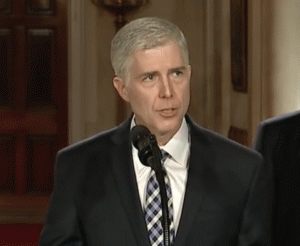From Truthdig

U.S. Supreme Court nominee Neil Gorsuch speaking at the announcement of his selection on Jan. 31, 2017.
(Image by (Screen shot from Whitehouse.gov)) Details DMCA
When Donald Trump's chief of staff Reince Priebus addressed the Conservative Political Action Committee in February, he identified two priorities of the administration: the confirmation of Neil Gorsuch to the Supreme Court, and deregulation.
It turns out that elevating Gorsuch to the Supreme Court and achieving deregulation are inextricably linked.
During Gorsuch's confirmation hearing, Democratic members of the Senate Judiciary Committee challenged him on his pro-business positions.
Minnesota Sen. Al Franken pressed him on a case -- that of the now-infamous "frozen trucker" -- in which the judge reached what Franken characterized as an "absurd" result.
Alphonse Maddin was driving a truck for TransAm Trucking Inc. in 2009 when the brakes froze on the trailer he was hauling. The heater inside the truck wasn't working, and the temperature outside was 27 below zero.
Maddin contacted his employer, who arranged for a repair unit to come to Maddin's location. While waiting for help to arrive, Maddin nodded off. "I awoke three hours later to discover that I could not feel my feet, my skin was burning and cracking, my speech was slurred, and I was having trouble breathing," he said at a recent event in Washington, D.C. When Maddin stepped out of the truck, he said he "was on the verge of passing out. I feared that if I fell, I would not have the strength to stand up and would die." Maddin was exhibiting symptoms of hypothermia.
He called his employer again to report that he was leaving to seek shelter. His supervisor ordered him "to either drag the trailer [with no brakes] or stay put."
"In my opinion, clearly, their cargo was more important than my life," Maddin said.
Faced with defying his employer's order to remain with his disabled trailer or freezing to death, Maddin chose to unhitch the trailer and drive his truck to safety.
TransAm fired Maddin for disobeying orders, and he filed a complaint with the Occupational Safety and Health Administration, an agency of the Department of Labor.
The operative statute in this case forbids employers from firing an employee who "refuses to operate a vehicle because the employee has a reasonable apprehension of serious injury to the employee or the public."
The Labor Department found that TransAm had violated the law, concluding that the word "operate" includes not only driving, but also "other uses of a vehicle when it is within the control of the employee." Maddin had refused to operate his vehicle in the manner his employer had ordered -- with the trailer hitched to the truck.
Of the seven judges who ultimately ruled on the case, Gorsuch was the only one who voted to uphold Maddin's firing. He decided that Maddin did "operate" his vehicle, which took him outside the statutory language that protects an employee who refuses to operate his vehicle.
What source did Gorsuch consult to construe the word "operate?" He turned to the Oxford English Dictionary, refusing to defer to the Department of Labor's broader interpretation of the statute. Gorsuch characterized "health and safety" concerns as "ephemeral and generic," writing, "After all, what under the sun, at least at some level of generality, doesn't relate to 'health and safety'?"
(Note: You can view every article as one long page if you sign up as an Advocate Member, or higher).





